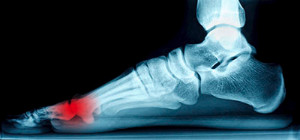Symptoms of Sesamoiditis
Monday, 30 April 2018 00:00 If you experience pain between the ball of the foot and the big toe, you may have a condition referred to as sesamoiditis. It originates from the sesamoid bones, which can be found under the big toe. If the foot has a high arch, these tiny bones endure additional pressure while walking or running. The purpose of the sesamoid bones is to propel the foot forward while walking, which may become difficult to accomplish if they become injured. The symptoms typically consist of pain in the foot while walking, in addition to becoming red and swollen. Wearing a shoe with adequate padding will aid in attaining a certain amount of relief and may take a portion of the pressure off the sesamoid bones. Additional treatment techniques may consist of binding the big toe, which may limit movement, and utilizing crutches to keep the weight off the foot. Please schedule a consultation with a podiatrist if you would like additional information about sesamoiditis.
If you experience pain between the ball of the foot and the big toe, you may have a condition referred to as sesamoiditis. It originates from the sesamoid bones, which can be found under the big toe. If the foot has a high arch, these tiny bones endure additional pressure while walking or running. The purpose of the sesamoid bones is to propel the foot forward while walking, which may become difficult to accomplish if they become injured. The symptoms typically consist of pain in the foot while walking, in addition to becoming red and swollen. Wearing a shoe with adequate padding will aid in attaining a certain amount of relief and may take a portion of the pressure off the sesamoid bones. Additional treatment techniques may consist of binding the big toe, which may limit movement, and utilizing crutches to keep the weight off the foot. Please schedule a consultation with a podiatrist if you would like additional information about sesamoiditis.
Sesamoiditis is an unpleasant foot condition characterized by pain in the balls of the feet. If you think you’re struggling with sesamoiditis, contact Dr. Steven Schwartz of Pennsylvania. Our doctor will treat your condition thoroughly and effectively.
Sesamoiditis
Sesamoiditis is a condition of the foot that affects the ball of the foot. It is more common in younger people than it is in older people. It can also occur with people who have begun a new exercise program, since their bodies are adjusting to the new physical regimen. Pain may also be caused by the inflammation of tendons surrounding the bones. It is important to seek treatment in its early stages because if you ignore the pain, this condition can lead to more serious problems such as severe irritation and bone fractures.
Causes of Sesamoiditis
- Sudden increase in activity
- Increase in physically strenuous movement without a proper warm up or build up
- Foot structure: those who have smaller, bonier feet or those with a high arch may be more susceptible
Treatment for sesamoiditis is non-invasive and simple. Doctors may recommend a strict rest period where the patient forgoes most physical activity. This will help give the patient time to heal their feet through limited activity. For serious cases, it is best to speak with your doctor to determine a treatment option that will help your specific needs.
If you have any questions please feel free to contact our offices located in Chambersburg, and Mcconnellsburg, PA . We offer the newest diagnostic and treatment technologies for all your foot and ankle needs.

